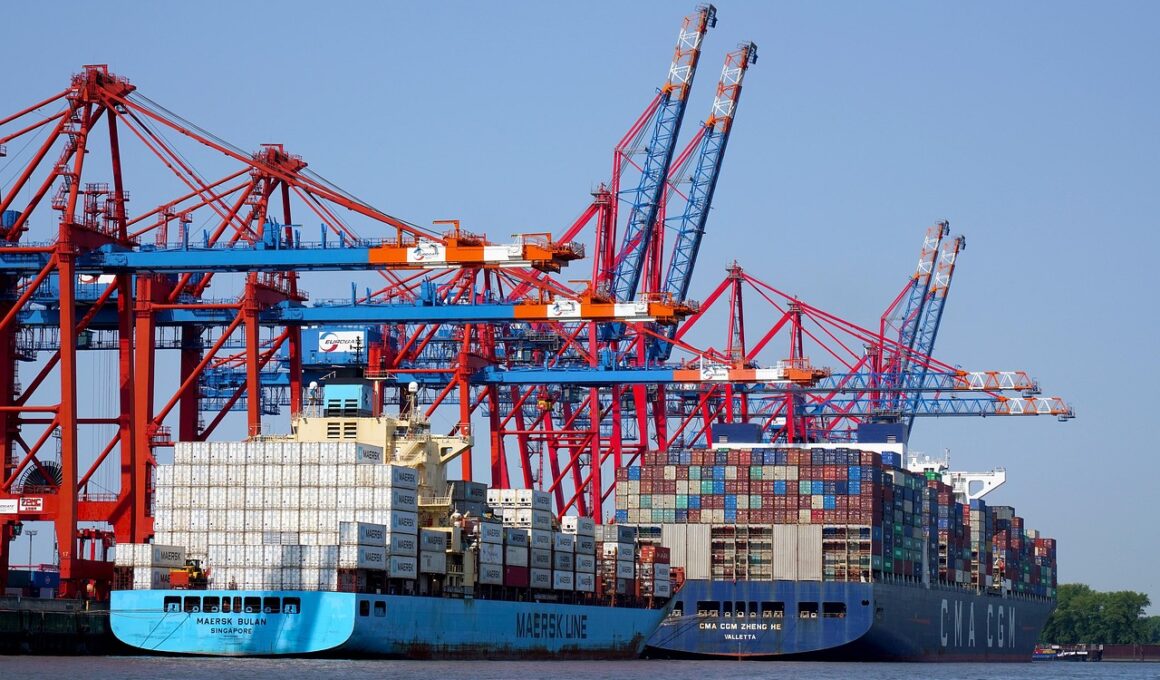The Effect of Brexit and Trade Policies on Supply Chain Finance
Brexit has fundamentally altered trade relations between the UK and the EU, presenting numerous challenges for supply chain finance. The elimination of frictionless trade has caused delays and increased costs, which have immediate impacts on financing. Import tariffs can disrupt cash flow for businesses as they face unexpected expenses. These shifts require companies to reevaluate their finance strategies to match the new trading environment. Access to working capital is crucial for managing these challenges. Moreover, the uncertainty of ongoing trade negotiations creates an unstable environment for businesses. Companies might need to look for alternative sources of supply chain finance to ensure stability. Traditional lenders may be cautious, given the increased risks associated with Brexit. As such, firms are increasingly turning to supply chain finance solutions that provide flexibility and assistance. Innovative financing solutions can mitigate the effects of trade barriers, enabling companies to maintain their operations amidst uncertainty. Understanding these challenges is essential for businesses striving to adapt their supply chain models effectively in a post-Brexit economic landscape.
One significant challenge that arises from Brexit is the potential for customs delays. In an environment where speed is paramount, delays at borders can disrupt supply chains. This slowdown can lead to a decreased level of customer satisfaction. Furthermore, companies must now factor in additional logistics and compliance costs that were previously unnecessary. Managing cash flow amid these added expenses becomes increasingly difficult for suppliers who have relied on swift transactions. Firms need to invest in technologies designed to navigate these new customs regulations effectively. Trade finance solutions that include customs and trade compliance information can be beneficial. Businesses must explore ways to mitigate delays by streamlining customs processes. Data-driven solutions can provide detailed forecasts to pre-empt potential issues and help firms prepare accordingly. By enhancing their supply chain visibility, businesses can anticipate challenges and fund their operations wisely. Understanding the evolving EU-UK trading environment will enable firms to make informed strategic decisions. Supply chain finance will need to adapt as businesses respond to the changing landscape, focusing on agility and resilience to navigate these challenges.
Currency Fluctuations and Funding Challenges
The volatility of currency exchange rates post-Brexit presents further complications for companies involved in supply chain finance. Fluctuations can dramatically increase costs for firms that rely on imports. These unanticipated changes can put an extraordinary financial strain on budgets that were carefully planned. Additionally, when companies transact in multiple currencies, it becomes increasingly complex to predict cash flows accurately. Companies must adapt their hedging strategies to protect against unfavorable currency movements. This necessity often leads to an increased demand for innovative financial products that can help mitigate risk. Supply chain finance tools that incorporate flexible currency management features become essential in this scenario. Moreover, access to fast funding options is vital for businesses facing currency volatility. Traditional funding sources may not be able to provide the rapid response needed in these fluctuating conditions. Consequently, businesses need to seek out alternative funding solutions. Digital platforms are becoming increasingly popular in offering real-time funding options, enabling firms to access the capital they require without extensive delays. These adaptations are crucial for maintaining operational stability in an unstable financial environment.
Changes in trade policies following Brexit have also raised concerns over compliance and regulatory risks. Different regulations governing imports and exports may require companies to allocate additional resources. Compliance with these regulations can strain budgets and resource management. Firms may face penalties for non-compliance, adding yet another layer of risk. Moreover, navigating various regulatory landscapes within the EU can lead to increased complexity in supply chain operations. Businesses will need to invest time in determining how these regulations affect their financing options. Engaging legal and financial experts can help companies stay ahead of compliance issues. With the right guidance, they can identify solutions that minimize risk while maximizing operational efficiencies. Some firms are choosing to enhance their technology platforms, ensuring they remain compliant. Real-time analytics can assist in managing regulatory risks effectively. By leveraging digital solutions, businesses can adapt their supply chain finance strategies swiftly. Staying compliant ensures businesses can maintain positive cash flow and minimize operational disruptions. Remaining informed about regulatory changes will be a critical factor in achieving success in supply chain finance post-Brexit.
Impact on Supply Chain Relationships
Another aspect of the supply chain finance challenges post-Brexit is how relationships between trading partners are affected. Trust and collaboration are necessary for successful financing solutions. With uncertainties arising from trade policies, partners may hesitate to commit to long-term agreements. This lack of confidence can erode established relationships, leading to delayed transactions and strained negotiations. Companies must work proactively to rebuild trust with suppliers and customers alike amidst these challenges. Transparent communication regarding potential impacts on pricing and delivery schedules is vital to retain partnerships. Additionally, companies can benefit from diversifying their supplier base. By engaging multiple suppliers, businesses can reduce risks associated with reliance on single relationships. Establishing contingency plans becomes crucial for managing disruptions in supply chains. Supply chain finance solutions that emphasize collaboration and transparency will gain traction. Effective risk management strategies will help businesses navigate the complexities of the new trading environment. Adaptable financial solutions will be essential for fostering and maintaining healthy relationships in a changing economic landscape, ultimately leading to improved resilience and business continuity.
Moreover, understanding how market demand fluctuates due to Brexit is critical for companies engaged in supply chain finance. Consumer behavior may change as people adapt to new market conditions, impacting how businesses plan their inventories. Demand forecasting tools can help firms anticipate shifts in consumer preferences more effectively. Allowing businesses to optimize stock levels reduces the risk of overstocking or stockouts during uncertain times. Companies must integrate data analytics into their supply chain finance processes. By leveraging market intelligence, organizations can make more informed decisions regarding inventory replenishments. This ability helps enhance cash flow management and reduces holding costs. The adoption of just-in-time inventory models can prove beneficial in the current economic climate. Additionally, companies can invest in relationships with logistics providers that allow them to respond promptly to changing market conditions. Investing in agile supply chain structures will provide a competitive edge in times of uncertainty. Firms should also explore innovative financing models that support adaptive inventory management. Emphasizing flexibility will be crucial as businesses navigate the ongoing complexities in the post-Brexit landscape.
Conclusion: Navigating Supply Chain Finance Challenges
In conclusion, Brexit and evolving trade policies introduce a myriad of supply chain finance challenges for businesses. The impact of customs delays, currency fluctuations, compliance risks, and changing relationships amongst trading partners creates a complex landscape. Companies must prioritize adaptive strategies that incorporate real-time data and forecasted analyses to optimize their financial operations. Innovation within supply chain finance will be critical in overcoming the challenges presented by Brexit. By diversifying suppliers and enhancing communication, businesses can build resilience against market disruptions while adapting to changes in demand. Furthermore, focusing on compliance and regulatory adherence will safeguard companies against penalties that could significantly impact their operations. As firms navigate this new terrain, they should continuously seek innovative financial solutions. Understanding and anticipating market dynamics will enable businesses to maintain competitive advantage amidst uncertainty. Companies that embrace emerging technologies and financial strategies will be best positioned for success. Ultimately, the ability to adapt and evolve will be key to thriving in a transforming supply chain finance ecosystem.
Supply Chain Finance (SCF) is a specialized financing method aimed at improving the cash flow of a business. It primarily focuses on optimizing working capital by enabling firms to shorten their cash cycle. The evolution of SCF can be attributed to the growing need for liquidity in supply chains. By transferring financial responsibilities along the supply chain, businesses can enhance their operational efficiency. Various financial instruments such as reverse factoring, dynamic discounting, and inventory financing are utilized in SCF. Each tool helps businesses manage cash flow while enhancing supplier relationships. Digital platforms are also essential in streamlining the SCF process. Moreover, improved visibility into supply chain operations has become increasingly important for effective SCF implementation. As businesses delve deeper into the world of SCF, understanding the challenges posed by trade policies and regulations will help in making informed decisions. Adopting new technologies and financial products facilitates better risk management and compliance with changing conditions, particularly post-Brexit. Therefore, businesses that embrace an integrated supply chain finance strategy will be better equipped to thrive in a rapidly changing global market.


